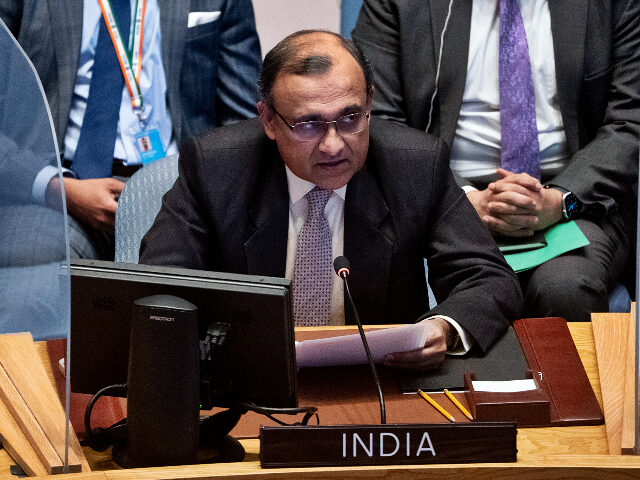A United Nations General Assembly debate on a resolution to condemn the Russian colonization of eastern Ukraine pivoted abruptly to South Asia on Wednesday as the permanent representative of Pakistan accused India of “modern-day colonialism” in the disputed region of Kashmir. India’s representative dismissed the complaints as “frivolous” and off-topic.
India and Pakistan both possess nuclear weapons and have been on the verge of war for decades, coming closest to war most recently last November as deadly Hindu-Muslim clashes erupted in Kashmir. India claims the entirety of the Jammu and Kashmir region as its own, while Pakistan refers to the territory as “occupied” by India and boasts openly of a desire to “conquer” it.
The General Assembly voted on Thursday to condemn Russia for announcing the “annexation” of four regions of Ukraine – Donetsk, Luhansk, Kherson, and Zaporizhzhia – in September, the fruit of an eight-year-old war that Russia began with the colonization of Crimea in 2014. With an overwhelming 143-5 vote and 35 abstentions, the resolution passed. The United Nations has no way of enforcing any of its resolutions and they do not mandate any particular action.
The U.N. Security Council attempted to pass a similar resolution in early October, but Russia used its veto power to block it.
India and Pakistan both abstained from the vote after using the emergency session on the war to complain about each other.
Grateful to 143 states that supported historic #UNGA resolution "Territorial integrity of Ukraine: defending the principles of the UN Charter". The world had its say – RF’s attempt at annexation is worthless & will never be recognized by free nations. 🇺 will return all its lands pic.twitter.com/FupYPfZz8M
— Володимир Зеленський (@ZelenskyyUa) October 12, 2022
Pakistani state media reported on Thursday that the nation’s U.N. envoy, Munir Akram, used the Ukraine meeting to compare the situation in places like Zaporizhzhia with Kashmir, condemning India’s alleged “colonial domination.”
“Pakistan fully supports the resolution’s call for respect for the principle of the sovereignty and territorial integrity of States. He said states cannot be torn apart by the use of force and these principles must be consistently and universally respected,” Pakistan’s state radio network reported. “He said Pakistan looks forward to seeing similar concern and condemnation about the attempts by India to formalize its illegal annexation of the internationally recognized disputed territory of Indian Illegally Occupied Jammu and Kashmir in complete violation of international law and relevant resolutions of the UN Security Council on Jammu and Kashmir.”
Akram did not offer any clarity as to why, if Pakistan allegedly supported the resolution, it abstained from voting in favor of it.
Pakistan’s Daily Times quoted Akram as accusing India of terrorism and potential genocide.
“India has incarcerated the entire Kashmiri leadership since 2019. Several of these leaders have died in the Indian custody, including Altaf Ahmad Shah, who passed away yesterday,” he railed. “This brutal campaign of oppression is turbo-charged by “Hindutva” ideology which asserts Hindus’s religious and ethnic supremacy and hate against Muslims and other minorities.”
“Such statements deserve our collective contempt and sympathy for a mindset which repeatedly utters falsehoods,” Kamboj said. “It is important, however, to set the record straight. The entire territory of Jammu and Kashmir is and will always be an integral and inalienable part of India irrespective of what the representative of Pakistan believes or covets.”
“We call on Pakistan to stop cross-border terrorism so that our citizens can enjoy their right to life and liberty,” she concluded.
Both India and Pakistan have failed to take on an aggressive position for either side on the Ukraine invasion and enjoy friendly ties to both Russia and the many of the Western powers supporting Ukraine, including the United States. India, in particular, has come under pressure from the West for continuing to do business with Russia, greatly increasing purchases of cheap Russian oil and coal in the face of Western sanctions. Indian diplomats have expressed irritation with Washington and Europe for judging the purchases.
“Look, I don’t want to sound argumentative … If India buying Russian oil is funding the war — tell me, then, is buying Russian gas not funding the war?” Indian Minister of External Affairs S. Jaishankar, the nation’s top diplomat, said in June. “It’s only Indian money and Russian oil coming to India funding the war, and not Russia’s gas coming to Europe, not funding? Let’s be a little more even-handed.”
Jaishankar brought Pakistan into his objections on Tuesday, complaining that the United States long maintained close ties to Islamabad and sold it weapons while denying similar purchases to India, leaving India to buy Russian weapons.
“We have a long-standing relationship with Russia, and this relationship has served our interests well … We have, as you know, a substantial inventory of Soviet and Russian-origin weapons, and that inventory actually grew for a variety of reasons,” Jaishankar explained, “you know, the merits of the weapon systems themselves, but also because for multiple decades, Western countries did not supply weapons to India, and in fact saw a military dictatorship next to us as the preferred partner.”

COMMENTS
Please let us know if you're having issues with commenting.